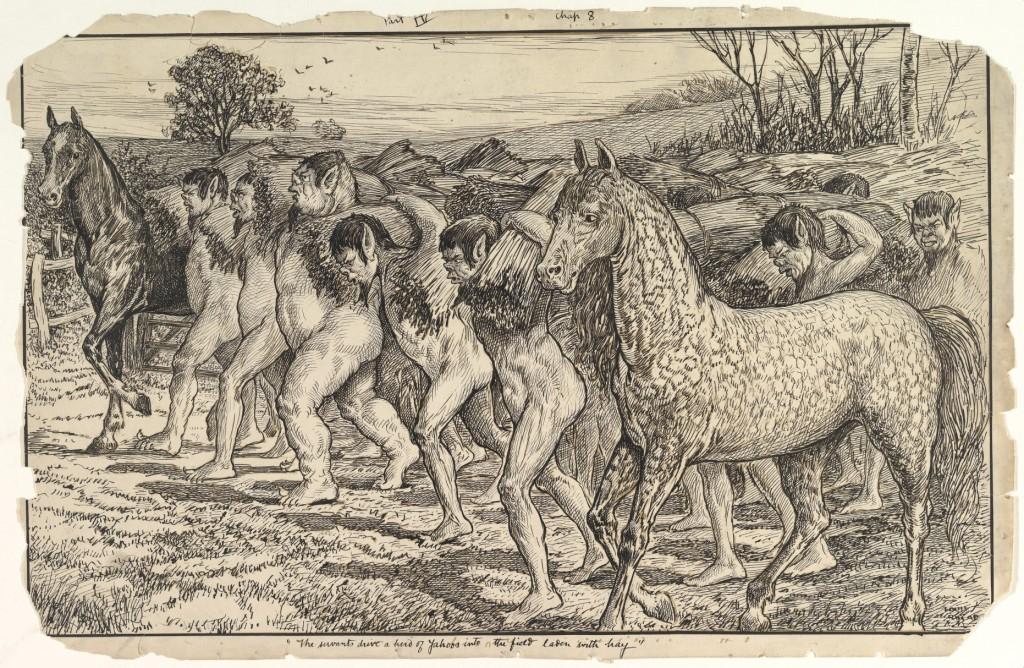Skip to main content
table of contents
Gulliver's Travels
"A Modest Proposal"
British
Age of Reason
Born in Dublin, Ireland, Jonathan Swift was arguably the best satirical writer in the Age of Reason. He spent his life trying to escape Ireland and find a position in London, yet he ended up defending the Irish people against British oppression. In his prolific body of work, Swift confronts the avarice and corruption of everyone from the political ruling class to the peasants of his own country, the folly of reckless science, and the hypocrisy of religion, drawing attention to the rational capacities of human beings while exposing their use of reason to increase their vice. Swift was named dean of St. Patrick's Cathedral, Dublin, in 1713. From his authoritative position, and armed with his cutting wit, Swift produced, among many other polemic works, two eighteenth-century masterpieces of satire.
Travels into Several Remote Nations of the World: in Four Parts, by Lemuel Gulliver, or Gulliver's Travel's (1726)
In Gulliver's Travels, Swift takes advantage of the popularity of eighteenth-century travel books to assert his commentary on the superior attitude of human beings, who are obsessed by their physical bodies instead of their minds, and who, even though they possess rational minds, do not use them to improve humankind. The magnificently descriptive, and sometimes grotesque, quality of Swift's novel continues to fascinate audiences and captivate critics even in the twenty-first century.
 The Servants Drive a Herd of Yahoos into the Field, from Gulliver's Travels, by Louis John Rhead. License: Public Domain
"A Modest Proposal" (1729)
Employing classical rhetoric, Swift proposes in the satirical essay A Modest Proposal a remedy for the starving Irish, who are forced from their lands by greedy British landowners. The Irish, like country folk in England, are also victims of the Enclosure Acts of Parliament beginning in 1604; common (shared) land that fed and fortified thousands of poor people was confiscated by the government and sold to wealthy aristocrats, many times for frivolous endeavors such as gaming and hunting parties. The Acts drove farmers and their families into the streets of larger, urban centers, where they lived in misery and want. Swift's daring and shocking proposal both highlights the plight of the Irish and places the blame on the very people who are readers of his work.
Consider while reading:
The Servants Drive a Herd of Yahoos into the Field, from Gulliver's Travels, by Louis John Rhead. License: Public Domain
"A Modest Proposal" (1729)
Employing classical rhetoric, Swift proposes in the satirical essay A Modest Proposal a remedy for the starving Irish, who are forced from their lands by greedy British landowners. The Irish, like country folk in England, are also victims of the Enclosure Acts of Parliament beginning in 1604; common (shared) land that fed and fortified thousands of poor people was confiscated by the government and sold to wealthy aristocrats, many times for frivolous endeavors such as gaming and hunting parties. The Acts drove farmers and their families into the streets of larger, urban centers, where they lived in misery and want. Swift's daring and shocking proposal both highlights the plight of the Irish and places the blame on the very people who are readers of his work.
Consider while reading:
- What is Swift's intent in making horses into rational beings and making humans into "yahoos" in Gulliver's Travels?
- Why does Gulliver come to despise his own race?
- Discuss Swift's use of facts and figures as part of his strategy. Who is he trying to reach through his scientific analysis?